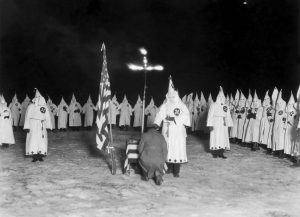 -Editorial
-Editorial
White supremacist ideas once confined to the margins of U.S. society have increasingly entered mainstream political and cultural spaces, shaping debates, influencing policy, and fueling polarization.
A panel of scholars and researchers on extremism and American politics outlined the conditions that have allowed exclusionary and extremist ideas to gain traction in the nation’s political and religious spheres, highlighting a combination of backlash, online radicalization, and evolving Christian nationalist movements.
White nationalism’s growing prominence in American politics predates the Obama and Trump eras, according to Sanford F. Schram, an adjunct lecturer in political science at Stony Brook University (SUNY) and co-author of Hard White: The Mainstreaming of Racism in American Politics. Schram said the election of Barack Obama as the nation’s first nonwhite president accelerated a movement that had been building for decades.
“The immediate cause was the election of the first nonwhite president in U.S. history, Barack Obama, but white nationalism had been gaining prominence in mainstream politics long before that,” he said.
Schram pointed to author John Ganz’s When the Clock Broke, which traces how figures such as Pat Buchanan made early inroads in the Republican Party during the Reagan years by promoting what he described as a “sanitized version” of rhetoric previously associated with Ku Klux Klan leader David Duke. That shift, he said, helped set the stage for the Tea Party’s reaction to the Obama presidency and later for Donald Trump’s ascent to the White House, driven in part by what Schram called a rising tide of white resentment politics, especially around immigration.
He added that younger generations are now engaging with extremist content online, treating neo-Nazi memes on platforms such as Twitter and Discord as if they are “the cool thing these days.” Schram said white nationalism “has a long lineage, but has become more prevalent in mainstream politics in the Trump era.”
Extremist rhetoric once confined to the fringes is becoming increasingly visible and socially acceptable, fueled by political discourse and the rapid acceleration of online echo chambers, according to journalist Heath Druzin, host of the Extremely American podcast, which covers the mainstreaming of extremist and militia movements and the rise of Christian Nationalism.
Druzin said recent online trends show a troubling shift in how openly some users embrace extremist figures. “There are an alarming number of people who are pretty fond of Hitler at the moment, and pretty okay saying it out loud,” he said. “We’ve gone from joking about how everything someone dislikes is ‘Hitler’ to people arguing that maybe Hitler’s okay. That shows how supercharged this mainstreaming has become.”
He pointed to political rhetoric as a key driver, citing Donald Trump’s 2015 comment labeling some Mexican immigrants as criminals and rapists. “That was the first big ‘wow’ moment where people wondered why a major political figure would say that — and others felt connected to it,” Druzin said. “That kind of talk has become a lot more acceptable in politics.”
Social media platforms have also played a central role, he added. Anonymous online spaces, Druzin said, allow users to express extreme views without consequences. “You get into echo chambers, you get a lot of approval, and you don’t have to deal with face-to-face backlash,” he said. “You feel emboldened to say things you wouldn’t say in public.”
The speed of online dissemination, he warned, has dramatically accelerated the spread of extremist ideas. “The rise of social media has made these things happen in months rather than years,” Druzin said. “We’re seeing ideas that would have been abhorrent to any mainstream politician become pretty acceptable — in ways that would have surprised most people even 10 years ago.”
According to Matthew D. Taylor, Ph.D., senior Christian scholar at the Institute for Islamic, Christian, and Jewish Studies (ICJS) and author of The Violent Take It By Force: The Christian Movement That Is Threatening Our Democracy, radical religious currents are increasingly intertwined with far-right politics, accelerating extremist narratives and reshaping the modern American right,
Taylor said he has observed many of the same trends described by other experts, including online radicalization and backlash tied to the Obama presidency, but noted that religion has become a powerful driving force in recent years. “One of the things that has really shifted in the last 10 years, beginning with Trump’s first campaign in 2015, is the enlistment of a whole new set of radical Christian actors into these movements,” he said.
He explained that the fastest-growing and most energetic segment of Christianity—non-denominational, loosely governed churches grounded in charismatic or Pentecostal-style spirituality—has been uniquely mobilized by Trump. “Trump has enlisted this coalition into broader far-right circles,” Taylor said. “This movement is growing rapidly in the U.S. and globally, and it mixes low oversight with a focus on supernatural experience.”
While the movement is multiethnic, Taylor said it carries powerful strains of Christian supremacy, fueled by a mix of longstanding narratives and new prophecies portraying Trump as a divinely appointed figure. “These narratives have built a kind of mythology that unites the right around Trump as a quasi-messiah, come to deliver the United States—and in some cases Israel—and to realign the world order,” he said.
That fusion of religious extremism and political grievance, Taylor warned, has energized the MAGA coalition in ways that reinforce both racial and Christian nationalist ideologies.
Far-right activism has expanded from fringe gatherings to the halls of state government, accelerating dramatically over the past three decades and reshaping public policy nationwide, according to Devin Burghart, executive director of the Institute for Research & Education on Human Rights (IREHR) and co-author of Breaching the Mainstream: A National Survey of Far-Right Membership in State Legislatures.
Speaking from Kansas City in the office of IREHR founder Leonard Zeskind, Burghart said Zeskind’s seminal book, Blood and Politics, documented how white nationalist movements marched “from the margins to the mainstream” from the 1970s through the Obama era. That history, he said, underscores a central lesson: movements matter. “If you want to understand this wave of far-right activism entering the mainstream, you need to understand the different political tributaries driving it,” Burghart said.
Those tributaries have widened dramatically. When Burghart began his work 30 years ago, researchers tracked roughly 25,000 hardcore far-right activists nationwide. “Today, just in one segment of the movement—the COVID-denial, anti-vaccine movement during the height of the pandemic—we tracked 2.4 million activists,” he said. Many were exposed to conspiratorial thinking and what he described as increasingly commonplace racial resentment.
That sprawling movement doesn’t just build momentum on the ground, Burghart said—it directly shapes politics. IREHR’s 2022 report identified 875 state legislators nationwide who had joined at least one far-right group, ranging from militia organizations to anti-Semitic networks to QAnon-aligned groups. Membership, he said, serves as both a stamp of approval and a policy pipeline. “Ideas once confined to the margins are now being pumped directly into the mainstream and becoming public policy,” he said.
He pointed to conspiracy theories about “chemtrails,” once the stuff of rural militia meetings. “Today, two states have adopted laws against geoengineering using the same conspiracy theories that were once considered laughable,” Burghart said. Their mainstream adoption reflects the movement’s growing influence.
In IREHR’s forthcoming 2024 update, Burghart said researchers found nearly 1,000 state lawmakers involved in far-right groups—evidence that the problem is expanding, not receding.


